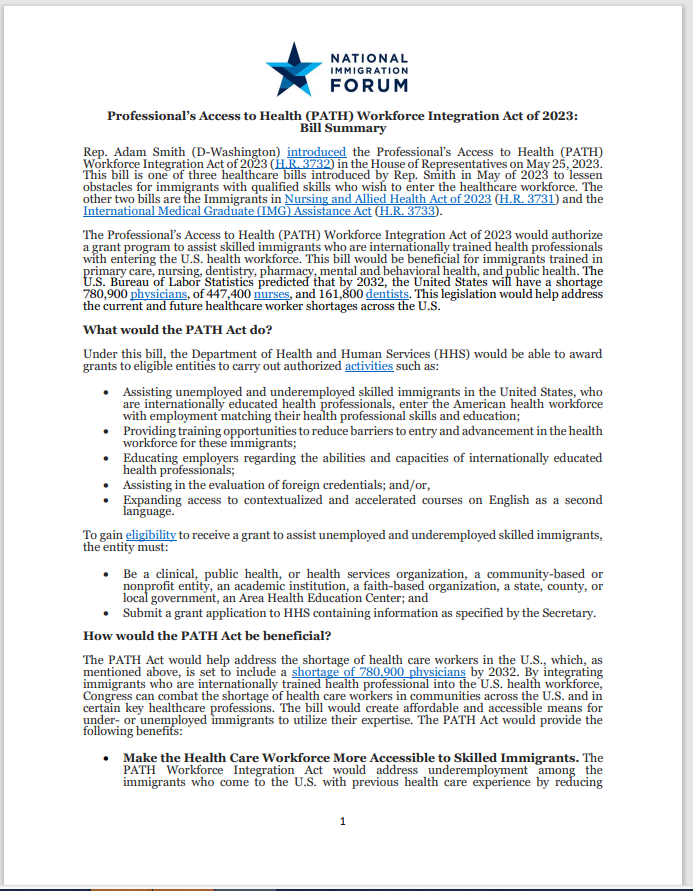
Rep. Adam Smith (D-Washington) introduced the Professional’s Access to Health (PATH) Workforce Integration Act of 2023 (H.R. 3732) in the House of Representatives on May 25, 2023. This bill is one of three healthcare bills introduced by Rep. Smith in May of 2023 to lessen obstacles for immigrants with qualified skills who wish to enter the healthcare workforce. The other two bills are the Immigrants in Nursing and Allied Health Act of 2023 (H.R. 3731) and the International Medical Graduate (IMG) Assistance Act (H.R. 3733).
The Professional’s Access to Health (PATH) Workforce Integration Act of 2023 would authorize a grant program to assist skilled immigrants who are internationally trained health professionals with entering the U.S. health workforce. This bill would be beneficial for immigrants trained in primary care, nursing, dentistry, pharmacy, mental and behavioral health, and public health. The U.S. Bureau of Labor Statistics predicted that by 2032, the United States will have a shortage 780,900 physicians, of 447,400 nurses, and 161,800 dentists. This legislation would help address the current and future healthcare worker shortages across the U.S.
What would the PATH Act do?
Under this bill, the Department of Health and Human Services (HHS) would be able to award grants to eligible entities to carry out authorized activities such as:
- Assisting unemployed and underemployed skilled immigrants in the United States, who are internationally educated health professionals, enter the American health workforce with employment matching their health professional skills and education;
- Providing training opportunities to reduce barriers to entry and advancement in the health workforce for these immigrants;
- Educating employers regarding the abilities and capacities of internationally educated health professionals;
- Assisting in the evaluation of foreign credentials; and/or,
- Expanding access to contextualized and accelerated courses on English as a second language.
To gain eligibility to receive a grant to assist unemployed and underemployed skilled immigrants, the entity must:
- Be a clinical, public health, or health services organization, a community-based or nonprofit entity, an academic institution, a faith-based organization, a state, county, or local government, an Area Health Education Center; and,
- Submit a grant application to HHS containing information as specified by the Secretary.
How would the PATH Act be beneficial?
The PATH Act would help address the shortage of health care workers in the U.S., which, as mentioned above, is set to include a shortage of 780,900 physicians by 2032. By integrating immigrants who are internationally trained health professional into the U.S. health workforce, Congress can combat the shortage of health care workers in communities across the U.S. and in certain key healthcare professions. The bill would create affordable and accessible means for under- or unemployed immigrants to utilize their expertise. The PATH Act would provide the following benefits:
- Make the Health Care Workforce More Accessible to Skilled Immigrants. The PATH Workforce Integration Act would address underemployment among the immigrants who come to the U.S. with previous health care experience by reducing licensing and certification hurdles. Currently, nearly 263,000 refugees and immigrants with professional health backgrounds are under- or unemployed in the U.S.
- Address the Growing Shortage in the Health Care Workforce. This bill would help mitigate the shortage of health care workers, which is expected to worsen in the coming decade. With retirement and workforce burnout from the COVID-19 pandemic contributing to this shortage, recruiting skilled immigrants can help bridge this gap.
- Promote Cultural Competence in Health Care. Expanding skilled immigrants’ access to the health care workforce would enhance the representation of members of diverse communities across the country. Reducing language and cultural barriers is important to enhance the quality of care in these communities.
.
The National Immigration Forum would like to thank Reem Turk, Policy and Advocacy Intern, for developing this bill summary.

